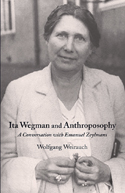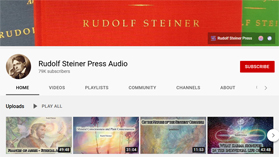
-
ITA WEGMAN AND ANTHROPOSOPHY
A Conversation with Emanuel Zeylmans
Wolfgang Weirauch

"I believe a time will come when greater distance makes the conflicts in the Anthroposophical Society - which at first sight seem so ugly - appear as part of the struggle for Anthroposophy in the twentieth century. When this future dawns, it will be important to be able to reach back to an historical documentation of what happened." - Emanuel Zeylmans
Following the reestablishment of the Anthroposophical Society at the Christmas Foundation Meeting in 1923, Ita Wegman - Rudolf Steiner's closest collaborator at the end of his life - became the object of intense opposition, systematic exclusion, and misunderstanding. This ostracism and misinformation continued even after her death, kept alive by prejudice and untruths that created an atmosphere that prevented a clear and unbiased view of her role in Anthroposophy. Because no real biography existed, even those who were open-minded and impartial found it difficult to make an informed assessment of the situation. This lack has been filled by Emanuel Zeylmans's three-volume work, Who Was Ita Wegman? In writing it, he had access to 100 undated notebooks, 2,000 manuscript pages, and 6,000 letters. Sifting these was an enormous project. It took Zeylmans twelve years to reach the esoteric heart of the "Wegman question," and what he found was extraordinary and extremely important to anyone interested in Anthroposophy and the divisive karma of its history.
Ita Wegman and Anthroposophy consists of candid interviews with Emanuel Zeylmans by Wolfgang Weirauch of the German journal, Flensburger Heft. Speaking candidly about the deepest aspects of his revelatory findings, Zeylmans describes the development of his passionate need to understand what happened to Ita Wegman and Anthroposophy. He talks of meetings with those who knew her intimately. He tells of her collaboration with Rudolf Steiner and her fraught relations with Maria Steiner and Edith Maryon, both of whom also claimed a special relationship with Rudolf Steiner. Zeylmans also describes the Christmas Foundation Meeting and the conflicts that followed Steiner's death, leading to Ita Wegman's expulsion from the Executive Council of the Anthroposophical Society.
Anyone interested in understanding the karma of the Anthroposophical Society will find this book illuminating. It would be a mistake, however, to consider it a book about the only past; it is also a book about the future of Anthroposophy.
Wolfgang Weirauch was born 1953 in Flensburg and studied politics, German literature, followed by theological studies at the free university of the Christian community in Stuttgart. He publishes Flensburger Hefte, an anthroposophic journal on topical issues.
Matthew Barton is a translator, editor, teacher, and poet, and taught kindergarten for many years at the Bristol Waldorf School. His first collection of poems was Learning To Row (1999). He has won numerous prizes for his work, including an Arts Council Writer's Award and a Hawthornden Fellowship.
November 2012; Trans. M. Barton; SB; 192pp; 235 x 140 mm; pb;
£17.99 ISBN 9781621480129

